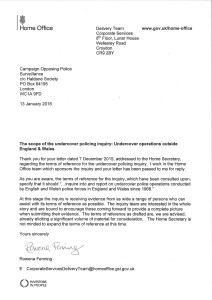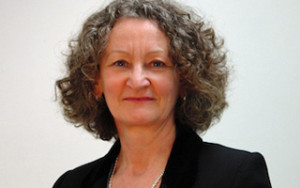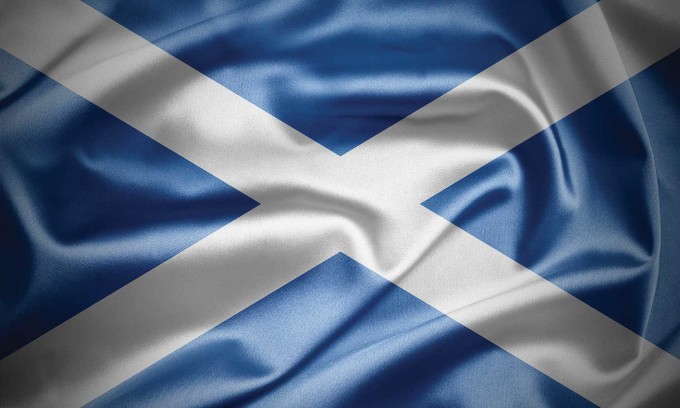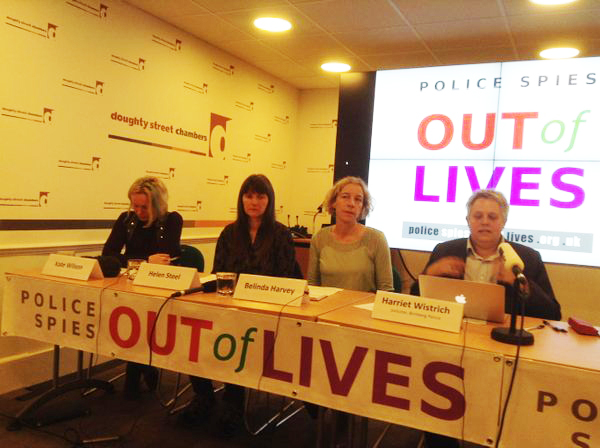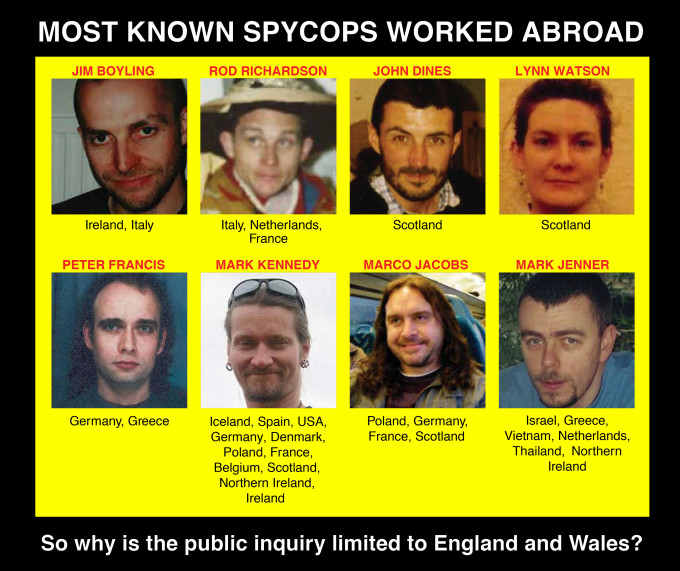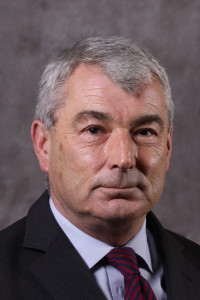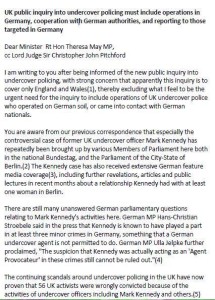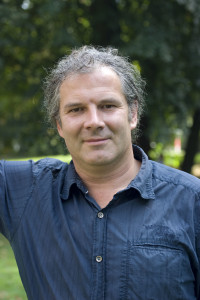Targeted Activists Call for List of All Spycops
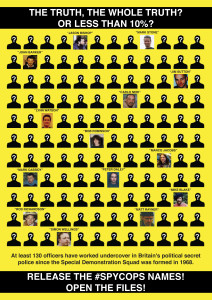 As the public inquiry into undercover policing prepares itself, it has designated 200 people and organisations that have a known significant link to the issue as ‘core participants’.
As the public inquiry into undercover policing prepares itself, it has designated 200 people and organisations that have a known significant link to the issue as ‘core participants’.
Of these, 21 are police and other state agents or agencies, whilst 179 are those who were targeted.
From those 179, 133 have signed a letter to the Inquiry with three demands:
1- Release the ‘cover names’ of all officers from the Special Demonstration Squad and National Public Order Intelligence Unit.
2 – Release the names of the groups who were targeted, believed to be over 500
3 – Release the Special Branch files on all core participants
This demand for disclosure echoes Doreen Lawrence’s call for there to be ‘a presumption in favour’ of naming the spycops.
It also attacks the police’s blanket use of “Neither Confirm Nor Deny” to frustrate attempts to find the truth. Last year’s apology from the Met to seven of the women deceived into relationships with undercover officers admitted
these legal proceedings have been painful distressing and intrusive and added to the damage and distress.
The exposure of the officers whose misdeeds the Inquiry takes so seriously has been a matter of chance – with 13 properly documented, there are still well over a hundred that nothing is known about. The only way to get the truth is if those who were targeted can tell their story, and that can only happen if they know they were spied upon.
The letter is a powerful call from the overwhelming majority of those the Inquiry recognises as being seriously affected. One core participant who signed, Stafford Scott, has likened the inquiry as it stands to a blindfolded boxer with their hands tied.
Another signatory is Kate Wilson, who successfully sued the police after being deceived into a long-term relationship by Mark Kennedy. She told the Guardian
It was only by chance that we found out Mark’s real identity. I might just as easily have been one of the hundreds who still don’t know. Everyone abused deserves the truth, not just those who happen to stumble upon it
The full text of the letter:
Dear Lord Justice Pitchford,
As 133 of the Inquiry’s Core Participants, we write to share our collective view that a fundamental requirement for the Inquiry’s success is to instruct police to disclose, as soon as possible, a list of names of all the organisations about whom intelligence was gathered; the cover names (not the real identities) of the individual officers responsible for infiltrating and reporting on activists and campaigns; and the individual Special Branch reports for each Core Participant group or individual.
We are aware that Preliminary Hearings are due to deal with anonymity and disclosure issues, but we feel it is vital to raise this broader point now on our own behalf and for those whose personal lives or political activities may have been profoundly affected by undercover policing but who are in no position to participate in the Inquiry because of the failure to identify the cover names of undercover agents or the groups spied upon.
Without this basic information, it is effectively impossible for the Inquiry to have a full picture of undercover policing. The only Core Participants in any position to give even a partial summary of facts they might eventually rely upon are the limited number who have already themselves researched and revealed, largely by chance, the existence of undercover officers, or those who have been informed by the media they had been subject to covert surveillance. Even then, it is difficult for non-state core participants and witnesses to contribute in any meaningful way while virtually all the documentary evidence remains in the hands of the police.
On top of this, Operation Herne [police self-investigation into the SDS & NPOIU] confirmed in July 2014 that the SDS alone targeted at least 460 groups for surveillance. When added to the unknown number of operations by the National Public Order Intelligence Unit, there are hundreds of organisations who still have no idea that they were spied upon. This means the overwhelming majority of individuals and organisations targeted since 1968 have had no opportunity to consider the possible consequences of the actions of undercover officers on their work and cannot currently participate as witnesses.
Core Participants and other current and potential witnesses are likely to struggle to provide testimony as long as there remains inadequate or non-existent information available to them. We are deeply concerned that a unique and historic opportunity may be lost unless the Inquiry is able to provide the vital details we seek.
The terms of reference of your Inquiry are broad: to examine the scope and motivations of undercover police operations in practice and their effect upon individuals in particular and the public in general. We therefore believe the issue of disclosure is absolutely critical. In our view, if the Inquiry is to have any realistic prospect of providing accurate insight into the “purpose, extent and effect of undercover police operations targeting political and social justice campaigners” it must do more than look at the activities of the tiny proportion of officers – less than 10% of the total from the SDS and NPOIU – that have already received publicity and exposure.
By their own admission, police records were patchy and much of what was documented has subsequently been lost or destroyed. Even without the resistance to genuine openness and transparency we are expecting, it is plain the police alone cannot provide an adequate narrative of their actions. The only way to discover a true picture of the impact of their undercover operations is to hear the testimony of those about whom intelligence has been gathered – and this is only possible if they know who spied on them and can reflect on the possible scale, implications and potential disruption caused by undercover officers.
We appreciate that the police will use every possible argument against providing greater openness and transparency, although there is no evidence that the public exposure of any undercover officer to date has either placed them at personal risk or posed any threat to national security. In our view, the police’s ‘Neither Confirm Nor Deny’ policy is less about protecting individuals and far more about blocking exposure of misdeeds.
We believe such a policy is untenable in a transparent public inquiry and that full disclosure is essential to discovering the truth. We urge you to set the tone for the future work of the Inquiry by insisting police disclose the information we need to fully participate.
Yours sincerely,
The following Core Participants
(numbers from the inquiry list of core participants v2. An updated PDF, v3, is here)
1 Advisory Service for Squatters
3 AJA
4 Albert Beale
5 Alice Cutler
6 Alice Jelinek
7 Alison (RAB)
8 Alex Beth Stratford
9 Alistair Alexander
10 Amelia Gregory
14 ARB
15 Barbara Shaw
17 Belinda Harvey
19 Ben Stewart
21 Blacklist Support Group
23 Brendan Mee
24 Brian Farrelly
25 Brian Healy
26 Brian Higgins
28 C
29 Cardiff Anarchist Network
30 Celia Stubbs
31 Chris Dutton
32 Claire Fauset
33 Claire Hildreth
34 Clandestine Insurgent Rebel Clown Army
35 Climate Camp Legal Team
36 Colin Roach Centre
38 Dan Gilman
39 Dan Glass
40 Danny Chivers
41 Dave Smith
43 Debbie Vincent
44 Defend the Right to Protest
46 Dónal O’Driscol
47 Duwayne Brooks OBE
48 Ellen Potts
49 Emily Apple
51 Frances Wright
52 Frank Smith
53 Gabrielle Bosely
54 Genetic Engineering Network
55 Geoff Sheppard
56 Gerrah Selby
57 Graham Smith
58 Gráinne Gannon
60 Hackney Community Defence Association
61 Hannah Dee
62 Hannah Lewis
63 Hannah Sell
64 Harry Halpin
65 Helen Steel
66 HJM
67 Hunt Saboteurs Association
68 Indra Donfrancesco
69 Ippy Gray
70 Jacqueline Sheedy
71 Jacqui
72 Jane Laporte
73 Jason Kirkpatrick
75 Jennifer Verson
76 Jesse Schust
77 John Jones
78 John Jordan
79 Juliet McBride
80 Kate Allen
82 Kate Wilson
84 Kim Bryan
85 Kirk Jackson
86 Kirsty Wright
87 Kristina Bonnie Jones (aka Tina Miller)
89 Leila Deen
90 Lisa (AKJ)
91 Lisa Teuscher
92 Lois Austin
93 London Greenpeace
95 Marc Wadsworth
96 Mark Metcalf
97 Martin Shaw
98 Martyn Lowe
99 Matt Salusbury
100 Megan Donfrancesco
101 Melanie Evans
102 Merrick Cork
103 Michael Dooley
105 Michael Zeitlin
106 Morgana Donfrancesco Reddy
110 Naomi (SUR)
112 Newham Monitoring Project
113 Nicola Benge
115 Norman Blair
117 Olaf Bayer
118 Oliver Knowles
119 Oliver Rodker
120 Paddy Gillett
121 Patricia Armani da Silva
122 Paul Chatterton
123 Paul Gravett
124 Paul Morrozzo
126 Piers Corbyn
127 Rhythms of Resistance Samba Band
128 Robbin Gillett
129 Robert Banbury
130 Roger Geffen
131 Rosa (Dil)
133 Ruth (TEB)
125 Sarah Shoraka
136 Shane Collins (aka William Shane Collins)
138 Sian Jones
139 Simon Chapman
140 Simon Lewis
141 Simon Taylor
142 South Wales Anarchists
143 Spencer Cooke
144 Stafford Scott
145 Steve Acheson
146 Steve Hedley
148 Suresh Grover
149 Suzan Keen
151 Terence Evans
152 The Monitoring Group
153 Thomas Fowler
154 Thomas Harris
155 Tim Byrne
157 Tomas Remiarz
158 Trapese
159 Trevor Houghton
160 VSP
161 William Frugal
163 Youth Against Racism in Europe
163 Zoe Young
Additional people made Core Participants since v2 list:
“Andrea”
Ceri Gibbons
Smash EDO

